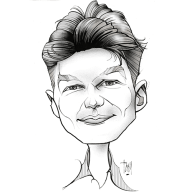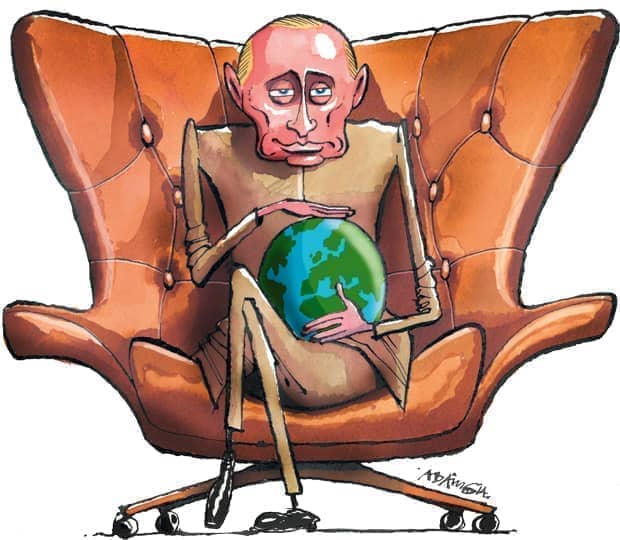The European Union’s top diplomat Josep Borrell is in Ukraine today. His mission? To show solidarity with Kiev in the face of Russian aggression. But the visit is too little too late. Former Soviet states, such as Ukraine, have grown used to the lofty rhetoric and empty gestures of their EU. The reality is that when it really matters, the West is failing to stick up for its allies. Linas Linkevičius, Lithuania’s former minister of foreign affairs, says it’s time for Brussels – and the rest of the West – to change tack when it comes to dealing with Russia.
Linkevičius is a stand-out Kremlin critic within European politics who believes that compromising with Russia only plays into Putin’s hands. For Linkevičius, the build up of Russian troops on the borders of Europe proves his point: Russia is biding its time waiting for the right moment to strike. But his warnings appear to fall on deaf ears when it comes to persuading Brussels to ditch its softly-softly approach on facing up to Putin.
For Linkevičius, the build up of Russian troops on the borders of Europe proves his point: Russia is biding its time waiting for the right moment to strike
Linkevičius sees little value in talks with Russia if Nato or Western allies have no clear understanding of their own goals. Instead, he says, each set of talks becomes ‘a smokescreen for Russia’ to hide behind the fact that their political intentions remain unchanged. The ongoing dialogue between Putin and Joe Biden is just the latest example of this, with countries on the frontline, such as Ukraine and Lithuania, inevitably destined to lose out, whatever the outcome of the talks.
As we begin a new year, with tensions between Russia and Ukraine unlikely to be resolved, Linkevičius says the greatest political threat facing Europe is instability. This, he says, stems from Europe’s inadequate responses to its antagonists. The key turning point? The 2008 Nato summit in Bucharest where, despite the efforts of Linkevičius and several other rebels, Ukraine and Georgia were not offered a path to membership. This failure allowed Putin to meddle in Nato’s decision-making. It set a dangerous precedent. Several months after the 2008 Nato summit, the Russo-Georgian War started. In 2014, we witnessed the annexation of Crimea. And more concessions are likely to follow as Biden does his best to avoid lighting a fuse in his dealings with Russia.
Putin, of course, insists he is acting in self defence, a view that Linkevičius gives short shrift. ‘Let’s verify the facts – Russia cannot be encircled physically by any means’ he responds punchily, pointing to the way Putin treats former Soviet nations as his backyard, ‘as an exceptional area of their influence’.
Linkevičius compares Russia’s aspirations of a divided Europe – the exact opposite of European aspirations of unity – to the Molotov-Ribbentrop pact, emphasising that a ‘selective approach towards international law cannot be accepted by default’. Yet Linkevičius is frustrated at what he sees as Europe’s resilience being continuously undermined by its own lack of action. Nord Stream 2, for example, risks damaging the independence of EU nations, leaving them exposed to Putin’s demands. Nations such as Germany, which is likely to become more dependent on Russian gas supplies in the years ahead, should take a leaf out of Lithuania’s book, according to Linkevičius. Lithuania used to be almost entirely dependent on Russian gas supplies until a new terminal was built in the port city of Klaipėda in 2014. As well as being able to supply all of Lithuania’s gas demands, it has the capacity to export surplus gas. ‘Energy is equivalent to sovereignty,’ Linkevičius says. It’s a pity that other European nations don’t seem to agree.
Linkevičius remembers 2013’s Euromaidan uprisings, also called the Revolution of Dignity, as a time when Ukrainian demonstrators filled the streets: ‘I do not know any other European capital (Kiev) where so many people were marching for European values’. Eight years on and the EU has demonstrated little reciprocal dignity or collective moral responsibility. Make no mistake, he says: this is nothing short of a win for Putin. ’We have to do more’ he insists. Europe‘s failure to form a united front in facing up to Putin exposes the bloc’s vulnerabilities. This is not the time to disappoint the early hopes of ex-Soviet nations, and certainly not the time to permit Russia to dictate or influence the future of Western alliances.







Comments